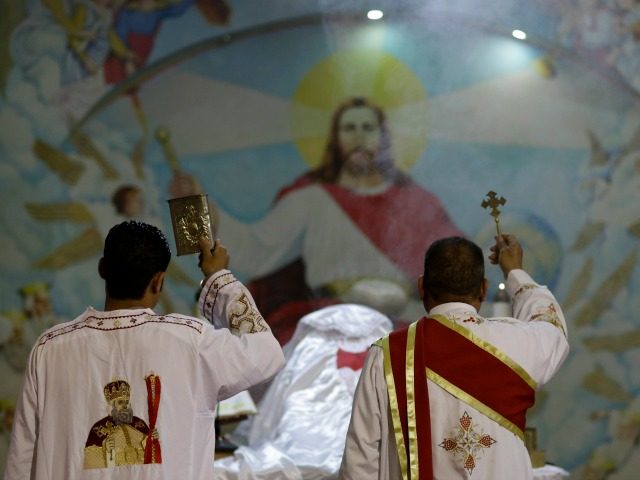The main Christian diocese in Egypt has announced that it will not hold Easter celebrations this year, in mourning for the 46 Coptic Christians killed in the Palm Sunday massacre brought about by twin jihadist bombings.
The Coptic Orthodox Diocese of Minya, located in southern Egypt, said Tuesday that commemorations of the Resurrection of Jesus will be limited to the liturgical prayers “without any festive manifestations” out of respect for the faithful who were slain by suicide bombers of the Islamic State.
The Minya province has the highest Coptic Christian population in the country and Christians there traditionally hold Easter Vigil services on Saturday evening and then spend Easter Sunday on large meals and family visits.
Christians in Minya have lived in constant fear of attacks from the area’s large Salafi Muslim population. In certain local villages, the faithful celebrate Mass before a cross drawn on a wall, making it easy to erase quickly in order to avoid attacks.
Police sources said that 28 people have been arrested for their possible ties to the planning and financing of Sunday’s attacks.
Using DNA testing, authorities have also identified the two perpetrators of the slaughter as Egyptians who had traveled to Syria yet managed to return to Egypt, bypassing border controls. The two jihadis carried out separate suicide bombings in the churches of Saint George in Tanta and Saint Mark in Alexandria while Palm Sunday services were being conducted. The attacks took the lives of 46 people, and left more than a hundred wounded.
One of the terrorists was identified with the nom de guerre of Abu Ishaaq al Masri, and was reportedly born in 1990 in the province of Sharqiya, located in the Nile delta north of Cairo. He is thought to have entered Syria in January of 2017 before authorities lost track of his whereabouts.
The bombing in Alexandria was reportedly the work of Abu al-Bar al-Masri, who blew himself up near the doors of the church just as he passed through the metal detector. According to the man’s relatives, he had made several trips to neighboring Libya, where he would stay for three months at a time.
On Tuesday, the Egyptian Parliament unanimously ratified the state of emergency that had been declared the prior evening by the cabinet of ministers of President Abdel Fattah el-Sissi. The state of alert will be in force for the next three months, at which time it may be renewed if need be.
The state of emergency gives the president wide and exceptional powers to establish special courts, intercept communications, impose censorship, or even decree a curfew.
Human rights activists have expressed fears that the state of emergency will add even more repression to a country where public freedoms have been crushed in the last four years under the pretext of fighting increasingly widespread terrorism.
The Pew Research Center reported Tuesday that Egypt is now the country with the highest level of government restrictions of religion in the entire world.
Meanwhile, the Islamic State has become more and more active in Egypt, especially in the region of North Sinai, and recently vowed to step up its attacks against Egypt’s Christians.
Along with the Palm Sunday attack, ISIS had claimed responsibility for the December 2016 bombing of a church next to St. Mark’s Cathedral in Cairo, an important religious site for Egyptian Copts.
That explosion killed 30 Christians and injured dozens more.
Follow Thomas D. Williams on Twitter Follow @tdwilliamsrome

COMMENTS
Please let us know if you're having issues with commenting.